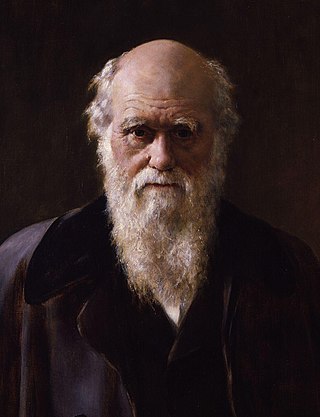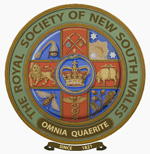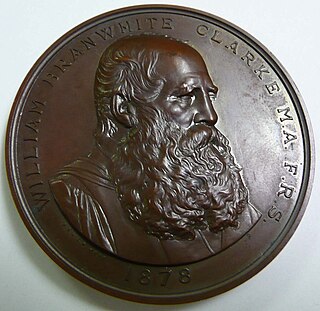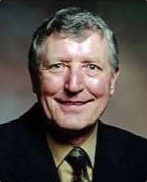Related Research Articles
The Linnean Society of London is a learned society dedicated to the study and dissemination of information concerning natural history, evolution, and taxonomy. It possesses several important biological specimen, manuscript and literature collections, and publishes academic journals and books on plant and animal biology. The society also awards a number of prestigious medals and prizes.

The Darwin Medal is one of the medals awarded by the Royal Society for "distinction in evolution, biological diversity and developmental, population and organismal biology".

Edmund Beecher Wilson was a pioneering American zoologist and geneticist. He wrote one of the most influential textbooks in modern biology, The Cell. He discovered the chromosomal XY sex-determination system in 1905. Nettie Stevens independently made the same discovery the same year and published shortly thereafter.

The Royal Society of New South Wales is a learned society based in Sydney, Australia. The Governor of New South Wales is the vice-regal patron of the Society. It is the oldest learned society in the Southern Hemisphere.
Peter William Hochachka, was a Canadian professor and zoologist at the University of British Columbia (UBC). He is known for his foundational work in creating the new field of adaptational biochemistry, connecting metabolic biochemistry with comparative physiology.
Prof David Meredith Seares Watson FRS FGS HFRSE LLD was the Jodrell Professor of Zoology and Comparative Anatomy at University College, London from 1921 to 1951.

The Clarke Medal is awarded by the Royal Society of New South Wales, the oldest learned society in Australia and the Southern Hemisphere, for distinguished work in the Natural sciences.

Sir Peter Chalmers Mitchell was a Scottish zoologist who was Secretary of the Zoological Society of London from 1903 to 1935. During this time, he directed the policy of the Zoological Gardens of London and created the world's first open zoological park, Whipsnade Zoo.
Brian Keith Hall is the George S. Campbell Professor of Biology and University Research Professor Emeritus at Dalhousie University in Halifax, Nova Scotia. Hall has researched and extensively written on bone and cartilage formation in developing vertebrate embryos. He is an active participant in the evolutionary developmental biology (EVO-DEVO) debate on the nature and mechanisms of animal body plan formation. Hall has proposed that the neural crest tissue of vertebrates may be viewed as a fourth embryonic germ layer. As such, the neural crest - in Hall's view - plays a role equivalent to that of the endoderm, mesoderm, and ectoderm of bilaterian development and is a definitive feature of vertebrates. As such, vertebrates are the only quadroblastic, rather than triploblastic bilaterian animals. In vertebrates the neural crest serves to integrate the somatic division and visceral division together via a wide range novel vertebrate tissues.
Geoffrey Allan Boxshall FRS is a British zoologist, and Merit researcher at the Natural History Museum, working primarily on copepods.

Cresswell Shearer, FRS, was a Canadian-British zoologist and Cambridge lecturer in experimental embryology, where he motivated his students to develop a keen interest in hands-on research, inviting them to practical marine research experience at Plymouth Laboratory of the Marine Biological Association of the United Kingdom during the summer months. It is also where he and Dorothy Jordan Lloyd worked as early pioneers on how to rear parthenogenetic sea-urchin larvae through metamorphosis. He also conducted research there with Harold Munro Fox and Walter de Morgan on the genetics of sea urchin hybrids.

Charles Joseph Krebs is a professor emeritus of population ecology in the University of British Columbia Department of Zoology. He is also Thinker-in-residence at the Institute for Applied Ecology at the University of Canberra, Australia. He is renowned for his work on the fence effect, as well as his widely used ecology textbook Ecology: The Experimental Analysis of Distribution and Abundance.

David Robert Jones, was a British born zoologist and biologist.

Christopher M. Wood FRSC is an adjunct professor of zoology at the University of British Columbia and a Lifetime Distinguished University Professor, and emeritus Professor of Biology at McMaster University. He is also a research professor at the University of Miami. His research is primarily concerned with Fish physiology and aquatic toxicology.

William James Sutherland is the Director of Research at the University of Cambridge Department of Zoology, and was previously the Miriam Rothschild Professor of Conservation Biology. He has been the president of the British Ecological Society. He has been a Fellow of St Catharine's College, Cambridge since 2008.

Helen Irene Battle was a pioneering Canadian ichthyologist and marine biologist. She was the first Canadian woman to earn a PhD in marine biology and she was also one of the first zoologists to engage in laboratory research. She was an emeritus professor of zoology at the University of Western Ontario from 1972.
Peter Anthony Larkin, (1924–1996) was a fisheries scientist who spent most of his career at the University of British Columbia. After his PhD at the Exeter College, Oxford, he moved to Canada as the Chief Fisheries Biologist of British Columbia, in a joint appointment between the provincial government and the University of British Columbia (UBC). At UBC, he later served as the Head of the Department of Zoology (1972–1975), as the Dean of Graduate Studies (1975–1984), and as the Vice President of Research (1986–1988). He authored some 160 scientific papers. He was also an admired teacher who won UBC's Master Teacher Award in 1971. Outside UBC, he served as the Director of the Pacific Biological Station at Nanaimo (1963–1966).
Jeremy Nichol McNeil was a British-Canadian biologist and zoologist. In 2004, he was named the Helen Battle Professor of Chemical Ecology in the Biology Department at the University of Western Ontario, having previously worked at Laval University.
References
- 1 2 "F.E.J. Fry Medal". Canadian Society of Zoologists. Retrieved 19 September 2019.
- ↑ Verne Thompson, ed. (2010). Awards, Honors, and Prizes. Gale Research Company. p. 263.
- ↑ A. H. Lawrie; S. R. Kerr, eds. (1976). Natura Naturans, Un Colloque Sur Le Paradigme de Fry. Environment Canada, Fisheries and Marine Service. p. 44.
- ↑ The Canadian Encyclopedia. McClelland & Stewart. 1999. p. 928. ISBN 9780771020995.
- ↑ "Bob Shadwick receives the F. E. J. Fry medal". University of British Columbia. December 10, 2018. Retrieved November 24, 2022.
- ↑ "6th International Symposium on Fish Endocrinology" (PDF). Retrieved November 24, 2022.
- ↑ Proceedings of the Royal Society of Canada: Délibérations de la Société Royale Du Canada. Royal Society of Canada. 1998. p. 78.
- ↑ Bill Ricker: An Appreciation. Springer Netherlands. 2007. p. 128. ISBN 9781402053665.
- ↑ "William S. Hoar Memorial Lecture". University of British Columbia. Retrieved November 24, 2022.